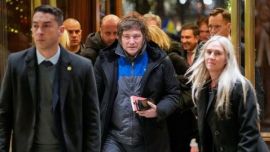Iconic Kirchnerite tycoon Lázaro Báez, considered a close ally to former presidents Néstor Kirchner and Cristina Fernández de Kirchner, was sentenced on Wednesday to 12 years in prison for money-laundering to the tune of US$55 million between 2010 and 2013 – the full sentence requested by Federal Prosecutor Abel Córdoba.
During the time of the allegations, Fernández de Kirchner was head of state. She now serves as vice-president.
The court’s verdict was that the money had been transferred to tax havens, then used to buy Argentine Treasury bonds to be later deposited in the Argentine accounts of Austral Construcciones, the company owned by Báez. The SGI financial company – more widely known locally as ‘La Rosadita’ – was a key part in this process, according to the courts.
From 2005 to 2015, Austral Construcciones firm won 51 government tenders worth more than 46 billion pesos, according to investigators.
The tycoon’s sons, Martín and Leandro Báez, were sentenced to nine and five years respectively, while the businessman’s two daughters Luciana and Melina received suspended sentences of three years.
Accountant Leonardo Fariña, a key whistleblower, received a five-year sentence with three years chopped off in recognition of his testimony while financier Federico Elaskar, another important state witness, was given 54 months. Daniel Pérez Gadín, Báez’s main accountant, and lawyer Jorge Chueco also received nine-year sentences.
A total of 22 persons were convicted and three acquitted by the Tribunal Oral Federal 4 (TOF 4) court. All sentences may be appealed and Báez’s defence team have already indicated they will do so.
The court also ordered the businessman to pay a fine of US$480 million as part of his conviction, a sum that exceeds his net worth.
Báez, 64, has been remanded in custody since April, 2016, which will reduce his sentence. Last September he was granted house arrest with an electronic anklet and he remains at an undisclosed location. Previous attempts to settle him at his home in a luxury gated community ended without success after protests from residents.
Reports this week said he is unlikely to return to jail for at least "a year and a year and a half," according to judicial experts cited the Clarín newspaper, who pointed to prosecutors' acceptance of the previous house arrest order.
One lawyer at the Comodoro Py federal courthouse told the newspaper that they expected Báez to spend the rest of his life behind bars, given the other charges he faces in other court cases.
In his last public comment to the court, on December 30 last year, Báez claimed he was a victim of "a systematic persecution by political power, the press and a large part of the Judiciary."
REACTION
Reaction to the conviction came thick and fast, with many opposition figures hailing it as evidence of widespread corruption in the Kirchnerite administrations.
"In Argentina there are brave judges. Lázaro Báez was sentenced to 12 years in prison for laundering money from corruption. Do you realise all the schools that could be built with the money that was stolen?" said opposition PRO party leader Patricia Bullrich in a post on Twitter.
Unsurprisingly, those close to the former president decried the verdict. "" The conviction of Lázaro Baez shows that the lawfare apparatus is still intact. Atrocities of all kinds are going to be done," said ex-Supreme Court justice Eugenio Raúl Zaffaroni.
Meanwhile, Neuquén Senator Oscar Parrilli suggested that the conviction was a result of prejudice.
“Lazaro is sentenced because he is dark, because he has a dark complexion, because he was a friend of Néstor Kirchner, because he is not part of the circle of power made up of the top businessmen in Argentina,” said Parrilli, a former state intelligence chief and secretary to the presidency during Fernández de Kirchner's time in office.
He described the conviction as "an atrocity" and linked it to political persecution, adding that it had a "racist and discriminatory tint."
EMPIRE
Originally a Banco Provincia bank clerk, Báez created a business empire in the Patagonian province of Santa Cruz where he won oil and public works contracts during the presidencies of Néstor Kirchner (2003-2007; died 2010) and Cristina Fernández de Kirchner (2007-2015).
Báez knew the former president from his first days as mayor of the Santa Cruz provincial capital of Río Gallegos in 1987, building him an imposing mausoleum upon his sudden death in 2010.
Now vice-president, Fernández de Kirchner, 68, stands accused in a separate trial of having favoured Báez in the awarding of more than 50 public works contracts in Santa Cruz, worth some US$1.2 billion, with presumed overpricing and failure to deliver in those concessions.
In two other trials against the former president, the tycoon is suspected of money-laundering via the Kirchner family hotel chain – charges insistently pressed by 2015 presidential candidate Margarita Stolbizer. The politician repeated her allegations this week, claiming that Báez directly benefited from public works contracts in Santa Cruz and that, in exchange, the businessman allegedly paid alleged kickbacks through the rental of rooms at hotels owned by the Kirchner family.
In total, Fernández de Kirchner – who claims she is a victim of "lawfare" and political persecution – faces nine cases in the courts against her related to alleged corrupt activity.
– TIMES/AFP
























Comments